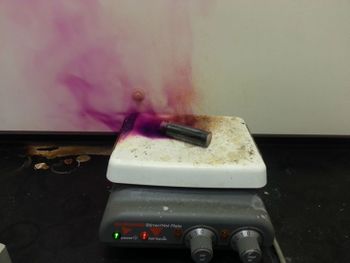Difference between revisions of "Hot plate"
| Line 14: | Line 14: | ||
==DIY hot plate== | ==DIY hot plate== | ||
| − | Lab hot plates can be easily made at home by connecting a heating element to an insulated plate. To add magnetic stirring, you can simply glue two magnets on a fan motor and place it below the heating element. | + | Lab hot plates can be easily made at home by connecting a heating element to an insulated plate. To add magnetic stirring, you can simply glue two magnets on a fan motor and place it below the heating element. However, if the heating plate is too thick, it may shield the stirrer from the two magnets from the motor, weakening the stirring power. |
Lab stirrer hotplates tend to be somewhat overpriced, and depending on your skills you can make one at home much cheaper than simply buying a brand new one. A good tutorial can be found [https://www.youtube.com/watch?v=b9Ct1aHvXZ8 here (though it's in Italian)]. | Lab stirrer hotplates tend to be somewhat overpriced, and depending on your skills you can make one at home much cheaper than simply buying a brand new one. A good tutorial can be found [https://www.youtube.com/watch?v=b9Ct1aHvXZ8 here (though it's in Italian)]. | ||
Revision as of 19:20, 5 April 2018
 |
This article is a stub. Please help Sciencemadness Wiki by expanding it, adding pictures, and improving existing text.
|
A hot plate is a portable self-contained tabletop small appliance fitted with (usually) one heating element, either electric or sometimes a gas burner. Electric hot plates tend to be more common, as they're safer to operate.
Contents
General
Hot plates consist of a flat body, which houses the internal circuitry, electric switches and the heating element. The heating element is inside the circular dome, while the temperature is controlled through buttons and voltage regulators.
Lab hot plates come in two models: the simple model, with only heating, and the one with magnetic stirrer, which is standard in labs.
Availability
Simple hot plates can be bought from most kitchen and electronic stores.
Lab hot plates, simple or also capable of magnetic stirring can be purchased from most lab suppliers, online.
DIY hot plate
Lab hot plates can be easily made at home by connecting a heating element to an insulated plate. To add magnetic stirring, you can simply glue two magnets on a fan motor and place it below the heating element. However, if the heating plate is too thick, it may shield the stirrer from the two magnets from the motor, weakening the stirring power.
Lab stirrer hotplates tend to be somewhat overpriced, and depending on your skills you can make one at home much cheaper than simply buying a brand new one. A good tutorial can be found here (though it's in Italian).
Projects
- Heating source
- Magnetic stirrer
Safety and handling
Hot plates do not glow when hot, and since they don't cool immediately after being turned off, you can burn yourself seriously if you accidentally touch them with your bare unprotected hand. Faulty insulation may lead to electrocution, make sure to check the hotplate for any defects.
See also
References
Relevant Sciencemadness threads
- Building an open source hot plate stirrer - feature requests!
- Hot Plate Overnight
- Hotplate / stirrer - Is it a good investment?
- Stirrer/hotplate too hot
- best magnetic stirrer hot plate for 150$
- Hot plate temperatures
- What exactly should you look for in a hot plate?
- hot plate issues
- Stains on hotplate
